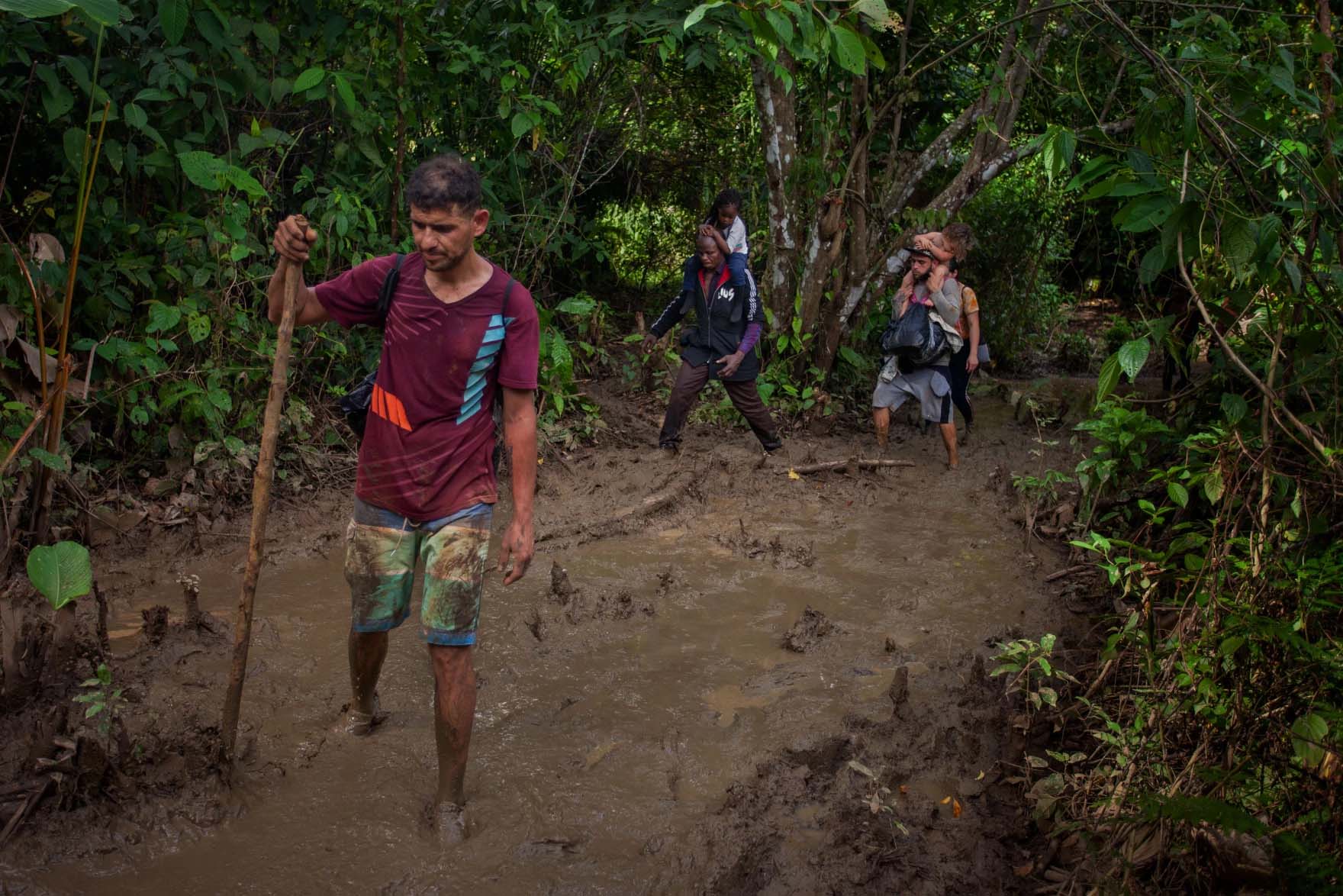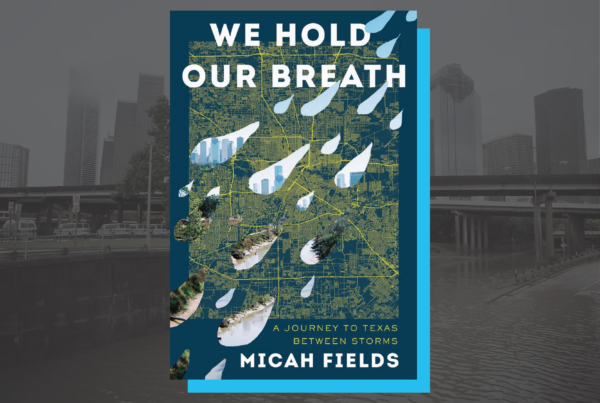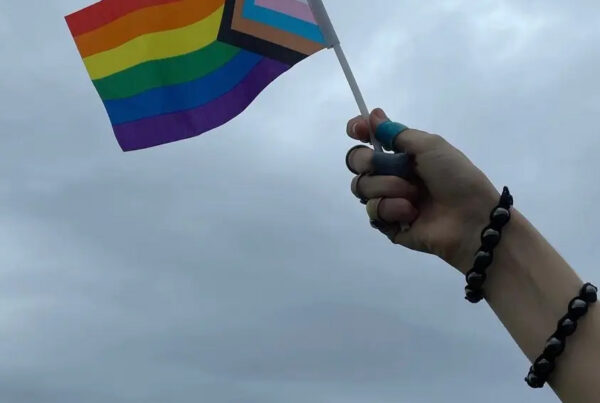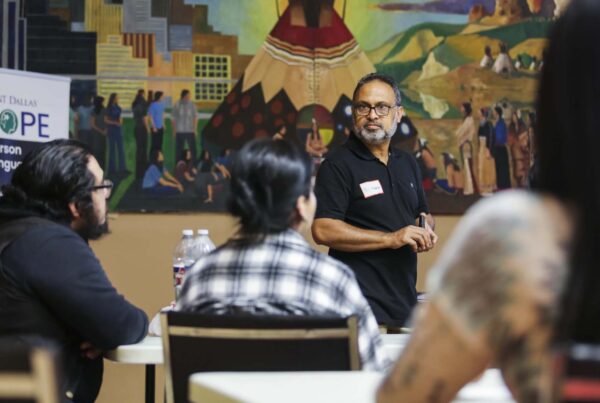From Texas Public Radio:
This story is part of a new TPR series Between Here and Home about how Afghans are navigating life in San Antonio after the war.
For Safi, the worst part of the nearly two-month journey from Brazil to the U.S. southern border was the four-day trek through the Panamanian jungle.
He says they just couldn’t stay dry. “No dry here,” he said of the journey that ended in January. “Everything was too wet. … We needed [a] fire. We found some woods from the trees. And we were so cold. But it was too wet. So we [were] not able to make a fire,” he explained.
The walk through the dangerous Darien Gap was worse for others though. He saw many, including children, who desperately needed food. The numbers of people traveling the region have exploded — especially for Afghans.
Each month this year, data from the Panamanian government said, around 300 Afghans made the journey. Last January, it was just one.
Nearly two years after the fall of the government in Afghanistan, people are still fleeing the Taliban to the U.S. More of them are making the arduous journey across Central and South America — walking through jungles — to reach the southern border, only to find uncertainty in the country’s immigration system.
But Safi said it was worth the risk to get to the U.S. He said the threat from the Taliban was real. His uncle was murdered in his village while Safi was on his journey.
“Some people called our family members. We found the body or his body at the side of the road,” he said.
TPR is using only his last name because of this ongoing threat to his relatives, who are still in Afghanistan.
In a nondescript ground floor office strategically leased in the heart of where most refugees are resettled in San Antonio, Safi brought his cousin to see Jonathan Ryan, an immigration attorney. Ryan also runs the refugee advocacy organization Advokato.
Safi’s cousin Muhammed, who just crossed from Mexico the week before, wore sandals and the traditional perahan tunban garment. Safi, who had been in the U.S. for five months, wore running shoes, jeans and a Houston Astros t-shirt.
Ryan said he’s seen a big increase in Afghan clients. San Antonio has been one of the largest resettlement populations after the collapse of the country. He asked to see Muhammed’s paperwork. He pulled the papers from a large manila envelope he held to his body.
“Okay, so this is the paperwork that immigration gave you to let you out from detention,” Ryan explained. “But it’s also telling you that there’s a court case that is now beginning.”
The court hearing isn’t for another two years, Ryan pointed out. The case is so new that he couldn’t find it on the online portal yet.
Safi translated for his cousin, who only spoke Pashto. Muhammed said he is responsible for his family in Afghanistan, and he needs to work.
“’I’m responsibility, like I’m holder of the house. So at this moment, I need to work, and I need to do something here,’ ” Safi translated.
Ryan explained they can file the asylum application soon but other steps needed to be taken, and it will still be about eight months before a work visa arrived.
The two men were both in deportation proceedings. They had to figure out a way to live in the meantime without being able to earn money. They shared a two-bedroom apartment with family in San Antonio — a dozen people in the one apartment.
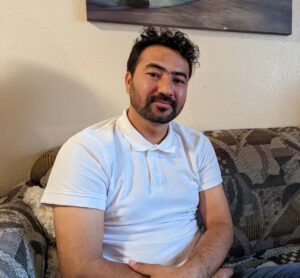
Ne’ematullah Ahmadi sits on his couch. He is not legally able to work and relies on assistance from nonprofits to keep the apartment he rents.
Paul Flahive / TPR
When Ne’ematullah Ahmadi arrived in San Antonio, he found resettlement agencies contracted by the government who were unwilling or unable to help. “‘You’re not Humanitarian Parole,’ We can’t do anything for you,” he recalled them saying. And also, they said, “‘you’re not eligible for our benefits.’ ”
About 70,000 Afghans were offered Humanitarian Parole during the recent evacuation. It entitles them to cash assistance and housing, food, and medical assistance.
But there was no plan for tens of thousands of others who were also threatened by the Taliban for their ethnicity, religion, or for working for the past government. Recent news reports estimated that nearly 100,000 people made their way from Afghanistan to the U.S. since the nation fell.
Ahmadi is a Hazara, a persecuted ethnic minority, and he also previously worked for the government. He crossed the border with his pregnant wife and two children after a 45-day journey from Brazil in December.
“We spent four or five days on the same bus, and we slept on the street. We slept at the forest — sleep at the bus stop at night,” he said.
Now they share a one bedroom apartment he rents by the week with money from a local nonprofit.
“I had to came here for the best future for my children. So we are educated person. I have bachelor degree and my wife is a medical doctor. We will be good for the United States. We will work hard for the United States.”
After five months in the U.S., Ahmadi — who applied for asylum — hoped to get a Texas drivers license to take his wife to medical appointments.
On a humid morning in May, he entered the Department of Public Safety office without an appointment and was directed to a counter where a woman stood.
People milled around the wide open room of yellow linoleum. A loud, automated woman’s voice echoed through building: “Now serving 8-0-0-9-4 at Counter 9,” it boomed.
Ahmadi was certain he had all the documents he needed for the day’s meeting. But as he spoke with the woman at the counter, his face darkened.
“Do you have your social?” she asked. He held up a piece of paper.
“OK. You have your passport but” — she paused — “the library card we don’t take,” she said.
“This is the confirmation of my residence,” Ahmadi said. He held up the piece of paper signed by the desk man at his apartment building.
“This,” she touches the sheet, “We don’t take this.”
Ahmadi was confused. He continued to explain that the documents should be enough. The woman handed him a document listing the acceptable necessary forms.
She added that the best she could do was set up an interview for another day.
Ahmadi later learned that he needed a work permit — something he wouldn’t have for months.
A proposal in Congress to streamline this process — the Afghan Adjustment Act — stalled.
Ahmadi was crestfallen. He said he hoped people in this country understand how difficult these rules make it for asylum seekers to live, to pay rent, to buy food, and to see a doctor.
“You know, I feel upset,” he added. “Because today I planned for getting the driver license — and that didn’t happen,” his voice nearly cracking. “All right — we have to go back home,” he said.
He was frustrated but he said he would try again. But, for the first time, on his face flashed a bit of doubt.


